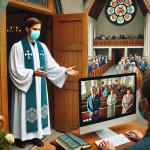
A majority of Americans recognize the importance of being a good neighbor, according to new State of the Bible research. Some 74 percent of people who are scripturally engaged said neighborliness is important. And a similar percentage of people with no religious affiliation shared that commitment.
State of the Bible is a series of annual reports about Americans’ relationships with God, faith and Scripture. The American Bible Society introduced the series in 2011 and continues to publish new chapters describing current research between April and December of each year.
Being a Good Neighbor
Christ taught his followers that love means action. It’s a verb rather than a noun. 1 John 3:18 says, for example, “Let us not love in word or in tongue, but in deed and in truth.” And James 2:14-22 tells us that love without action is dead.
See chapter 4 of the 2024 report — called Love in Action — here. The chapter “highlights the impact of Scripture engagement on the value of neighborliness” and asks this question: “What do Americans think about how to treat others?” the American Bible Society explained.
The new research looks at loving your neighbor through these five actions:
- Welcoming immigrants into your community
- Befriending people of other races
- Befriending people of other religions
- Caring for people who are in prison
- Advocating for people who are oppressed by society
A Shared Belief?
“From our research, we see that those who engage with Scripture place high importance on loving their neighbors, just as Jesus did. From advocating for the oppressed to befriending those of other races, these believers promote what we call pro-social behaviors,” explained John Farquhar Plake, PhD.
Plake is the American Bible Society’s chief innovation officer and editor-in-chief of the State of the Bible series.
Do biblically engaged people and people who have no religious affiliation – aka, “the Nones” — really share beliefs about being a good neighbor?
Apparently, they do. “Any community grows stronger as people help one another protect the rights of others and serve as volunteers for the greater good,” the report said.
“Perhaps if these unchurched ‘Nones’ recognized how deeply some Christians care for their neighbors in these specific ways, they might find relationships with Christians to be more attractive and want to join in,” Plake speculated.
Key Findings
The fourth chapter of the report – “Love in Action” – reported these key findings:
Seventy-four percent of people who are engaged with the Bible said they strongly or very strongly agree that neighborliness is important. “None of them indicate any level of disagreement,” according to the report.
“Nearly 6 in 10 Americans agree ‘strongly’ or ‘very strongly’ that it is important to be a good neighbor, with Boomers+ scoring the highest of the demographics and Millennials scoring the lowest.” In addition, 61 percent of women believe that being a good neighbor is important, compared to 56 percent of men….”
People who are biblically disengaged “are more likely than Scripture Engaged individuals to agree strongly on the importance of welcoming immigrants….” They have similar views about forging friendships across religious lines.
“The Scripture Engaged group leads the way by far in the lack of disagreement with any of the pro-social matters,” the report said. “Though there is uncertainty around executing these pro-social behaviors, Scripture Engagement individuals still understand that the Bible encourages them to participate in some way.”
State of the Bible 2024 pointed out that the survey presents issues in very few words, without additional information or definitions. “Respondents will, of course, add their own context – for instance, whether the immigration is legal or illegal. With that in mind, we find significant movement on these issues in recent years, especially among Practicing Christians….”
“All groups are less apt to consider it important to welcome immigrants than they’ve been in previous years, but the decline is greatest among Practicing Christians. Non-Christians now place more importance on this than Practicing Christians do,” the report noted.
There also has been a slight decline in the value that Practicing Christians, Non-Practicing Christians and Non-Christians place on befriending people of other races. There also was a slight decline in the importance that people place on caring for the environment, with non-Christians considering it more important than Christians.
When survey participants were asked, “Is it important for me to be a good neighbor?” only one in 40 said “no.” Participants didn’t always agree on the definition of “neighbor,” but they did generally agree that being a good neighbor is important. Read the report here.
Researchers also asked people who said they had attended church in the last month about protecting the environment, befriending people of other races, and caring for people in prison, researchers obtained the following results:
- Fifty percent of respondents agreed or strongly agreed that caring for the environment was important.
- Forty-four percent agreed or strongly agreed on the importance of befriending people of other races.
- Twenty-seven percent agreed or strongly agreed that caring for people in prison was important.
Forty-two percent of people who are biblically engaged said it’s important to submit to government leaders.
“This indicates a significantly higher value placed on civic responsibility than the Movable Middle (15 percent) and biblically disengaged (8 percent).” The Movable Middle consists of people who are not engaged in Bible reading or study but are open to Christ’s message.
The Nones value pro-social action much more than any other group They also are more likely to believe it’s important to welcome immigrants, advocate for people who are oppressed and make friends with people of different religions or races.
However, they draw the line on caring for people in prison. When asked about the prison population, the “Nones” measured evenly with other groups in the survey, the report said.
What’s Next?
The 2024 State of the Bible report is based on a nationally representative online survey conducted by NORC at the University of Chicago. Researchers questioned 2,506 American adults in all 50 states and the District of Columbia.
“Between August and December 2024, American Bible Society 2024 will release five new chapters in the State of the Bible story, including research on societal and cultural influences, coping with loneliness, and philanthropy.”


